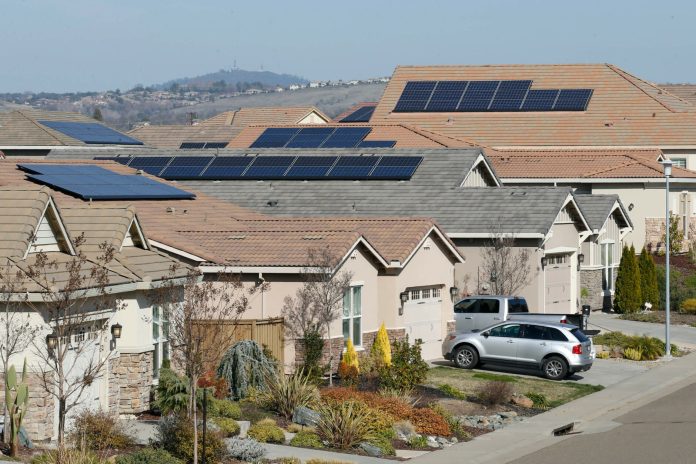Three environmental groups said the new rules make it harder to entice people, especially low income people, to install solar.
Despite months of protests against a rule change for solar panels decreasing the incentives new solar panel owners get for giving their excess energy back to the grid, the California Public Utilities Commission denied an appeal made by a number of environmental groups for the commission to rehear and review the new rule.
The rule, which took effect April 15, revolves around “NEM” or net energy metering, a tariff created for people with solar panels which allows them to give energy they don’t use to the grid. For that, customers are given credit on their electrical bills.
In December, the utilities commission updated the tariff that bolsters incentives provided by the federal government from the Inflation Reduction Act for solar and battery storage. The agency also added more electricity bill credits for people who put in solar and solar battery storage in the next few years, including low-income people and members of Native American tribes. Most controversially, the commission adopted a rate change for homeowners who install rooftop solar panels for the first time.
The commission touts the changes as ways to encourage people to use electricity when it’s most beneficial for grid reliability, put in battery storage and to shift load demand from evening hours to overnight or midday hours.
But the Center for Biological Diversity, the Protect Our Communities Foundation and the Environmental Working Group say the new tariffs slashed what rooftop solar owners get from sharing their excess energy by 75% to 80%, making solar less financially beneficial, which they claim will dramatically reduce the growth of rooftop solar and other distributed generation of energy — especially in low-income communities, working class communities, communities of color, and communities affected by environmental justice issues.
“It’s really disturbing that state regulators continue to block working-class Californians from the benefits of rooftop solar,” wrote Roger Lin, an attorney at the Center for Biological Diversity, in a statement provided by the group. “State lawmakers have added to the insult by making deep cuts to an equity fund intended to help everyday folks afford renewable energy. It’s mind-boggling behavior for a state that’s supposed to be leading the transition to a just and affordable energy system.”
The groups also claimed that the new rules violate the legal mandate for any successor tariff to ensure the continued growth of distributed generation in California, and the tariffs mandate to include specific alternatives designed for growth among residential customers in disadvantaged communities.
“Contrary to the joint parties’ contention, the statute does not require the Commission to maintain the current growth rates. In the decision, the Commission emphasizes that the growth of the market ‘should not come at the undue and burdensome financial expense of nonparticipant ratepayers,’” states the commission’s order, issued on Friday, denying rehearing of the NEM policies.
The environmental groups argued that the new NEM rules increased the payback periods, the time it takes for solar panel owners to save as much on their electric bills as they paid for their solar panels, which would decrease people’s electric bill savings and diminish people’s interest in installing solar panels. The commission didn’t buy the argument.
“The Commission took these perspectives into consideration and agreed that it should consider the length of time for a customer’s payback period, but it was not persuaded that payback periods are the predominant factor for customers when considering solar adoption,” the commission said in their order. “The decision cited 2013 and 2017 National Renewable Energy Laboratory studies ‘showing that consumers (especially in California where rates are amongst the highest in the nation) look at monthly bill savings when making an economic decision on adopting solar.’”
The commission also pushed back on the environmental groups’ claims that the new NEM tariff, by eliminating a proposed equity fund and rejecting a separate cost of solar installation analysis for low-income communities, violates the requirement that the tariff includes specific ways to spur more solar adoption in disadvantaged communities. In the order, the commission details a number of programs that help low-income people adopt solar, like the Disadvantaged Communities-Single-family Solar Homes program, which provides free solar installations for low-income single family homeowners.
The environmental groups still have one more path to stopping the new NEM tariff though. In May, the groups petitioned the First Appellate District to review the policy. That case is still ongoing.
Representatives of the California Public Utilities Commission and the Center for Biological Diversity did not immediately respond to requests for comment.






